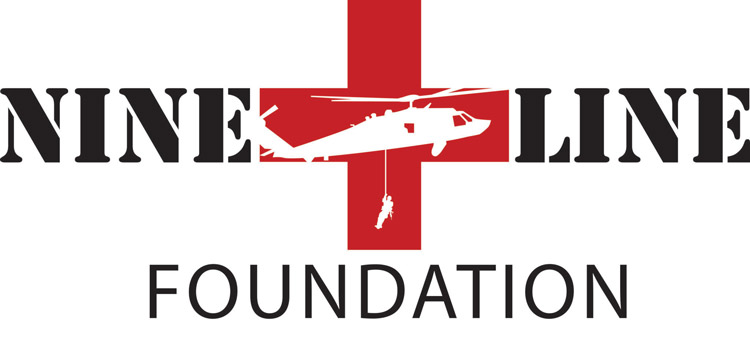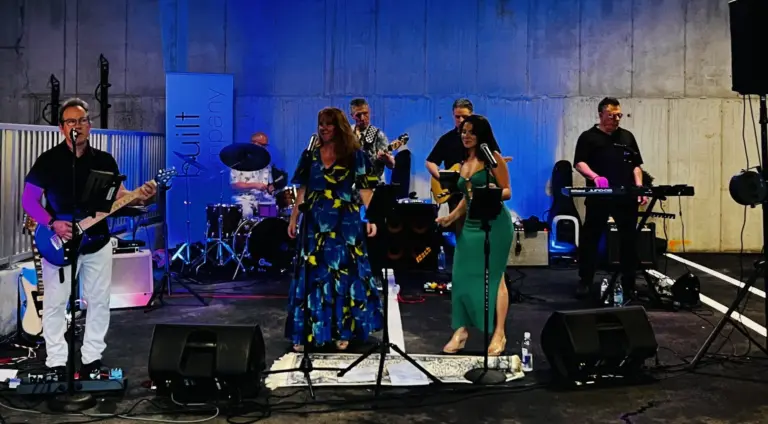
By Francis Ambrogio
The saying “no man left behind” characterizes America’s military culture. Wherever they may be and whatever danger they may face, America’s warriors pledge to take care of one another, come what may. For the Nine Line Foundation, “no man left behind” does not end on the battlefield.
A “nine-line” is a military report that signals that an individual is in need of medical evacuation, or “medevac.” Consisting of nine pieces of essential information, ranging from the urgency of the wounds to the equipment necessary to extract the patient to potential hazards on the pick-up zone, this brief report – sent over the radio in as little as sixty seconds – gets a helicopter in the air, racing to collect casualties and get them to care. Speed is of the essence, as sometimes medical support can be far away, and treating a casualty within the “golden hour” from the time of injury dramatically increases his chances of survival and recovery. The helicopters that come to extract casualties from danger are often referred to by the callsign “DUSTOFF.” This acronym stands for: “Dedicated Unhesitating Service To Our Fighting Forces.” This phrase encompasses the general attitude of the American people towards their men and women in uniform.
The Nine Line Foundation, named for that report, works to support those same men and women once they have left the service. Nine Line Foundation was founded by former Army officer and Greenwich, Connecticut native Tyler Merritt, who also founded Nine Line Apparel, a for-profit business that designs and sells “relentlessly patriotic” apparel and also helps the veteran community. In 2012, one of then-Captain Merritt’s classmates from West Point, Captain Edward “Flip” Klein, was seriously wounded in Afghanistan. In order to help Flip and others like him face their “new normal” – and all of its daunting challenges – Merritt created the Nine Line Foundation.
An all-volunteer non-profit, with zero-overhead, Nine Line Foundation works with one veteran at a time, helping some of the nation’s most severely wounded warriors adapt to their own “new normal.” This is something beyond the scope of what most of us, even in the military, deal with in our daily lives – injuries such as severe burns and lost limbs, as well as some wounds less visible, yet deep and lasting nonetheless.
The Foundation has helped wounded veterans attack these challenges head-on. Flip, who retired from the Army as a major, spent 15 months at Walter Reed Hospital recovering from his wounds. Afterwards, he needed a special bed that would allow him to regulate his core body temperature, an extremely expensive medical necessity not covered by the Veterans Administration. Nine Line Foundation provided it for him. When a fire destroyed his family’s home, Nine Line Foundation was there again to support him and make sure that he would be able to sleep soundly.
Nine Line Foundation, in cooperation with other non-profits, has helped wounded veterans build “forever homes” that support their overcoming the limitations they face. For many, this means ensuring wheelchair accessibility throughout the house – a unique requirement that greatly increases the cost of construction. Additionally, each recipient has different needs, so the solutions are unique. For example, Army Staff Sergeant Chaz Allen lost both of his legs and had an arm fused at a ninety-three degree angle, so the Foundation helped him get an adaptive lawnmower and high-durability cookware so he can help his family prepare meals. For Army Sergeant First Class Aaron Causey, who lost both of his legs and suffered extensive tissue damage as well as a traumatic brain injury (TBI), Nine Line Foundation contracted a company to build a 100% handicapped accessible playhouse so he could continue to make memories with his young daughter.
The current recipient of Nine Line Foundation’s support is Sergeant Eric Morante, US Marine Corps (retired). On April 20, 2007, a suicide bomber drove a truck with more than 3,000 lbs. of explosives under a bridge that Sgt. Morante and his squad were guarding. Six of his eight squad members were gravely wounded and needed to be medevac’d. Sgt. Morante suffered a severe TBI, shattered his wrist, and lost his right leg above the knee. Today, he is showing both what a military nine-line and the Nine Line Foundation can do, as he has become the first Marine amputee sanctioned to box in the United States and is pushing for boxing to become a recognized Paralympic sport in 2020.
Around the world, American soldiers risk life and limb every day, and some, for the rest of their lives, bear burdens that are unimaginable to most of us. Americans are overwhelmingly supportive in every way – from sending cards while troopers are deployed to welcoming them home from overseas. It is difficult to put into words how much they value this. (Yes, even the tough, wise-guy tank gunner who comments that the crayon-drawn tank he received in a Christmas care package from a kindergartener is missing its “doghouse”– in layman’s terms, the sight for the cannon – he cherishes the sentiment.) The sure knowledge of coming home to a country with open arms helps build the resolute confidence that carries soldiers, sailors, marines, and airmen through each mission they accomplish and every day they are away from their loved ones.
The Nine Line Foundation, symbolized by a helicopter pulling a wounded warrior up on rope, takes the DUSTOFF spirt one step further by continuing that dedication to service after the fight is over, and when the rest of life begins.
Francis Ambrogio is a Cos Cob native and an active duty officer in the United States Army. He graduated Greenwich High in 2011 and West Point in 2015, and he is currently forward deployed in the Republic of Korea. The opinions in this article are his own and do not necessarily represent those of the US Army, Department of Defense, or US Government. To learn more about Nine Line Foundation, Inc., go to ninelinefoundation.org




